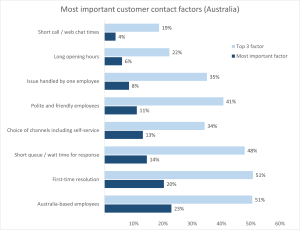In today’s rapidly evolving business landscape, effective leadership and sound decision-making are critical to the success of any organisation. Within the contact centre industry, the role of the board members of Auscontact cannot be overstated.
As the primary governing body of the organisation, these individuals are tasked with driving strategic direction, ensuring compliance, and fostering a culture of innovation and growth.
The Chairperson of Auscontact Association, has over 25 years of experience in the ICT and Contact Centre industries. He is the Executive Chairman and Founder of Omada One Inc. Sean has significant experience in managing and implementing contact centre programs, including projects focused on internal process improvement, operational effectiveness, service improvement programs, and technology selection.
The Deputy Chairperson, is the General Manager, Customer Service Department, for Auto and General Insurance Services. He has been actively involved in the contact centre industry for the last 18 years, and his passion for the industry has driven his involvement in the ATA and now Auscontact Association since 2006. He possesses a wide range of knowledge and experience across government and private enterprises and has experience in both outsourcing and offshoring, having spent a year in South Africa building a 150-seat contact centre.
A Non-Executive Director of Auscontact Association, is the General Manager Customer Contact at Bank of Queensland. Tanya is a human centred and passionate leader who has demonstrated the ability to deliver innovative change through a wide range of contact centre roles. Some of Tanya’s achievements include the implementation of a work from home model, on and offshore centre deployment, telephony replacement, and digital transformation. Tanya has worked predominantly in financial services having previously worked as Head of Everyday Banking at ANZ.
A Non-Executive Director of Auscontact Association, is the National Contact Centre and Operations Manager for Teachers Mutual Bank. Tim has over 25 years’ experience working strategically and operationally across Customer Experience teams within the Banking & Financial services sector both here in Australia and in the UK. Tim is a dedicated advocate of the Auscontact Association’s vision in being part of the united voice for the customer contact industry in Australia. He brings with him the ability to apply critical thinking through a governance lens across topics that relate to the internal demands of Contact Centres as a collective industry.
A Non-Executive Director of Auscontact Association, is a Director at BBB Advisory. Steve has over 25 years active involvement in the contact centre industry, including previous terms as Director and Chairperson when the organisation was known as the Australian Teleservices Association and played a pivotal role in establishing Auscontact. Steve has extensive board experience beyond his previous time with the ATA, including 3 years as National Chair of the Australian Institute of Credit Management. Steve is currently Chairman of the Canningvale Community Bank (Bendigo Bank) and has served on numerous government and industry boards with distinction.
A Non-Executive Director of Auscontact Association, is the Executive Director, Operations and Improvement for Smart Service Qld in Queensland government. She is a senior professional with extensive leadership and business management experience in the contact centre industry. Tracey is passionate about business transformation that enhances the customer experience and delivers quality outcomes. Throughout her career, Tracey has built a strong network and has been committed to helping shape and grow the industry through representation on various committees.
A Non-Executive Director and Director of Stutz Consulting, has 22 years of experience in the local and international contact centre industry. He has worked with customers, managed data, and voice networks, and provided front floor and general management. Michel has been working independently for the last 4 years, supporting, and implementing CX-related projects in contact centres and SMEs, as well as corporate services work. He is also a supporter of Invest Victoria and aims to stimulate foreign investment. Michel is passionate about the industry and has been on the Auscontact Board Innovation Sub-Committee, helping find ways to operate during the pandemic and beyond. He aims to promote a culture that supports innovative ideas and initiatives that add value for members in the long term.
Is the Head of Customer Care at Futurity Investment Group, with over 25 years of experience in the Customer Service industry. He has managed large 24×7 call centres and back-office administration including billing, connections, data management, sales, new business support, and credit/collections. As a strong change manager, Paul is focused on strategic planning, service improvement, and excellence. He aims to bring a diverse view on customer service challenges to the Auscontact Association and integrate back-office operations into a customer-centric approach. Paul’s leadership style and change management skills make him an asset to the Board, as a thought leader, mentor, and experienced professional willing to share his experiences.
Has over 25 years of experience in the banking and financial services industry. He has expertise in IT, sales and marketing, ecommerce, project management, contact centres, human resources, technology implementation, and knowledge management. Gerard is currently the Chief Information Officer of Teachers Mutual Bank Limited and leads the Sales, Marketing, and Digital teams for four banks. He aims to increase sales, drive business development, and improve the user experience. Gerard is a member of the Australian Institute of Company Directors and loves understanding people.
Chief People and Culture Officer at Recoveriescorp, has over 14 years of experience in the contact centre industry, working across Australia, New Zealand, the Philippines, and Fiji. Her passion is to connect people with purpose and effect positive change for customers and the community. Rachel has led the cultural transformation at Recoveriescorp through strategic values alignment initiatives, creating a high-performance workforce. She is an expert in remuneration, capability, talent management, OH&S and governance, and is a valued executive for her empathetic leadership style. Rachel is also passionate about gender diversity and mentors emerging female leaders.
Director of Innovation at Serco, has over 30 years of experience in the global contact centre industry. He has worked in various levels of the industry, from a call taker to running global operations across several countries. Simon was the inaugural Chair of the CCMA and is currently focusing on industry thought leadership and advanced management techniques for modern Government contact centres. He is also an experienced Board member, having completed his GAICD and is a certified wine judge, with a passion for all things wine.
Effective leadership and sound decision-making are crucial in the rapidly evolving business landscape. The board members of Auscontact Association play a pivotal role in driving strategic direction, ensuring compliance, and fostering a culture of innovation and growth in the contact centre industry. The current board members bring extensive knowledge, experience, and passion to the table, with each member contributing unique perspectives and skills to the organisation. Together, they form a strong team dedicated to advancing the interests of the industry and ensuring its continued success.















